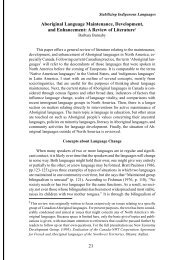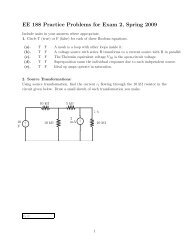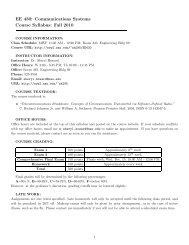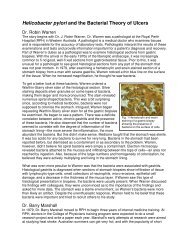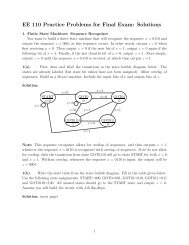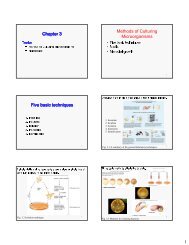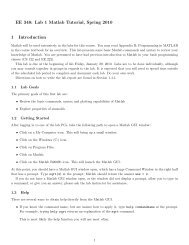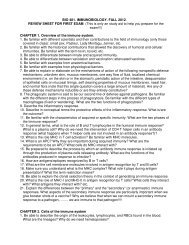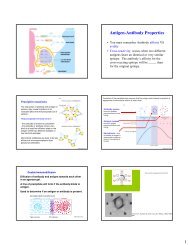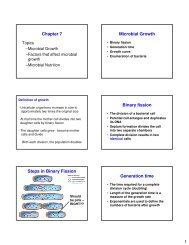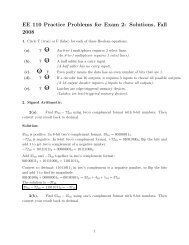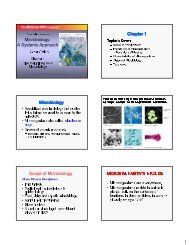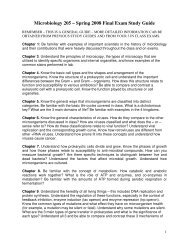82 What my Hualapai Language Means to Me
82 What my Hualapai Language Means to Me
82 What my Hualapai Language Means to Me
You also want an ePaper? Increase the reach of your titles
YUMPU automatically turns print PDFs into web optimized ePapers that Google loves.
Stabilizing Indigenous <strong>Language</strong>s<br />
<strong>What</strong> <strong>my</strong> <strong>Hualapai</strong> <strong>Language</strong> <strong><strong>Me</strong>ans</strong> <strong>to</strong> <strong>Me</strong><br />
Damon Clarke<br />
I grew up in an environment that many of you may have shared. My grandparents<br />
raised me. They taught me our language, our culture, and all our relatives.<br />
They taught me a lot. I remember when <strong>my</strong> uncle (a year older than me,<br />
he’s like a brother <strong>to</strong> me) and I would listen <strong>to</strong> the conversations they had with<br />
one another and with visi<strong>to</strong>rs. We would listen <strong>to</strong> them and if we got caught,<br />
they’d verbally reprimanded us: “Gak nyu wi:j’m de’ “; “Mi yam ja’ “; “Ya’ mi<br />
wi’ja”; “Ya mi wika”; “O’p kyu Gak nyum wijam de.”<br />
To us, this was the natural way, we’d take this reprimand serious, this was a<br />
way of life. It was taken as, there it is, we got caught. It didn’t matter <strong>to</strong> us<br />
because it wasn’t the first time and it sure wasn’t going <strong>to</strong> be the last. We listened<br />
well; they taught us a lot as did others in the family. But we continued on;<br />
we learned the language, experimenting with words, especially the bad words.<br />
(I need <strong>to</strong> remind you now; we were curious, crazy little kids running around,<br />
snotty nosed, no shoes, and hair uncombed.)<br />
We didn’t know any better, we didn’t care. We were just small, we were<br />
“Alive” and “Happy.” We didn’t know or understand we were “poor.” Later on<br />
we found this out. Someone came up <strong>to</strong> us and <strong>to</strong>ld us, “Hey, you’re poor!” I<br />
believe it was a government person that <strong>to</strong>ld us. This was saddening, because <strong>to</strong><br />
me, I wasn’t poor. I had <strong>my</strong> grandparents, they teach me, and you’re telling me<br />
I’m poor Man, <strong>my</strong> head went down, I was like a little puppy that was scolded.<br />
But, I remember those times: <strong>my</strong> uprearing, <strong>my</strong> language taught by <strong>my</strong><br />
grandparents. It has been uplifting <strong>to</strong> me. I was pulled away from a lot of the ties<br />
after a short period of time when both <strong>my</strong> grandparents died. I then lived with<br />
<strong>my</strong> Great Uncle “VK” and “Auntie” in Peach Springs. It was <strong>my</strong> choice <strong>to</strong> live<br />
with them or <strong>my</strong> aunt in Kingman. My aunt was sort of mean, but the gentleness<br />
and care from an older person was more pleasing. There, I learned more about<br />
<strong>my</strong> relatives, <strong>my</strong> language, and the land. I met more older people, learned from<br />
them much of the older terminology of the <strong>Hualapai</strong> language.<br />
But, as with <strong>my</strong> grandparents, ties were severed, many of the older people<br />
have gone on. This is one of the biggest concerns we need <strong>to</strong> address. We need <strong>to</strong><br />
help our grandparents. We need <strong>to</strong> listen <strong>to</strong> their teachings, their knowledge.<br />
Today, I’m afraid because if all the older persons are gone, <strong>my</strong> generation could<br />
be considered the elderly. In a few years I’ll be a grandparent, and that’s scary!<br />
We speak of the older people, and now the younger people look at me. I think<br />
and say, “Golly, I’m still young” and realize the impact.<br />
<strong>Language</strong>s are an issue and an everyday reality with everyone. For example,<br />
if I came up <strong>to</strong> you we would shake hands, we meet, and we converse. All in<br />
English. It used <strong>to</strong> be, we would come <strong>to</strong> the Flagstaff Pow Wow. I remember<br />
seeing some of the older people going in<strong>to</strong> tents. They would be meeting, conversing,<br />
and speaking all languages: Hopi, Tewa, <strong>Hualapai</strong>, Navajo, Maricopa,<br />
<strong>82</strong>
83<br />
Stabilizing Indigenous <strong>Language</strong>s<br />
and so forth. They were speaking all the languages among themselves, and it<br />
was good.<br />
Now, we’re talking about having our own languages saved, where it used <strong>to</strong><br />
be mutually shared. Our values, dress, and religions have changed dramatically.<br />
In viewing our communities, I see a lot of new churches. I’m not saying they’re<br />
bad, but they have changed our thoughts and ways of life.<br />
When I’m in a classroom, unknowingly I’m wondering what the professor<br />
is saying in <strong>my</strong> language. Where’s the focus here Where’s the connection<br />
How can I connect the concept in<strong>to</strong> our language so students of mine will be<br />
able <strong>to</strong> understand Yes, there are differences in <strong>Hualapai</strong>. The dialect varies<br />
from band <strong>to</strong> band, home <strong>to</strong> home, from home <strong>to</strong> school, from young <strong>to</strong> old. I’ll<br />
give you an example: One evening, <strong>my</strong> father-in-law came over <strong>to</strong> visit. We<br />
were having dinner, and so during the meal, he asked one of daughters, “Ko:’<br />
nya ha’ mi ne:ka” (Grandchild, bring me some water). Our daughter unders<strong>to</strong>od<br />
Ko’ as piñon only, and rarely heard the term Ko:’. After our visit, our daughter<br />
came up <strong>to</strong> <strong>my</strong> wife and I and asked, “Mom, Dad, why did grandpa call me<br />
Piñon” We laughed and explained. Later on, we found out similar s<strong>to</strong>ries with<br />
others and how words could mean different things if said incorrectly or in a<br />
different dialect. That has made us wonder what is going on with our languages<br />
How can we relate ourselves <strong>to</strong> that end of it<br />
Even with the differences in dialect, <strong>Hualapai</strong> could go down <strong>to</strong> Phoenix,<br />
Maricopa land, and we could converse in language, in cus<strong>to</strong>ms, in dance. My<br />
people could go <strong>to</strong> Mohave lands and converse, trade, visit, and sing. But, we<br />
cannot come up <strong>to</strong> Dine’ and converse now, that has changed. We don’t have the<br />
Old Ways that were once honored. This exchange of Life has vanished. It would<br />
be good <strong>to</strong> have the Pow Wow return <strong>to</strong> Flagstaff at Thorpe Park. This is where<br />
everyone can mingle, have a good time, meet old friends, and meet new. It would<br />
be a way <strong>to</strong> share in language, culture, and trade again.<br />
We haven’t lost our ways in the last 500 years since the arrival of Columbus.<br />
We’re still here. For many of us, our language is the key. The key in thinking,<br />
our educational system, and our ways. It may have changed, but it is still<br />
intact, although the United States is still pushing <strong>to</strong> get us in<strong>to</strong> the mainstream<br />
and civilize us. They are pushing for National Standards <strong>to</strong> make all people fit<br />
the norms. But, the realization is that it will never occur. They need <strong>to</strong> come <strong>to</strong><br />
our level, where we have our own standards.<br />
Technology is another issue. We have huge areas that we used <strong>to</strong> congregate<br />
and discuss issues without the use of microphones. You would be able <strong>to</strong><br />
hear without the mike and visit at the same time. This was a natural amphitheater.<br />
Tribal governments need <strong>to</strong> become more involved in preserving our languages<br />
and ways. In <strong>Hualapai</strong>, we have pushed and adopted a “<strong>Hualapai</strong> Only”<br />
Resolution in our Nation. It is still enforced.<br />
Community control is another area of concern. We need more control of our<br />
economic development, our livelihood, our destiny. We need <strong>to</strong> choose what is<br />
right for our people and our yet unborn.
Stabilizing Indigenous <strong>Language</strong>s<br />
Yes, casinos are here in our Nations. We need <strong>to</strong> utilize this technology <strong>to</strong><br />
our advantage. The signs posted need <strong>to</strong> be in our language. The proceeds could<br />
go <strong>to</strong> language, education, cultural exchange, and maintenance.<br />
Our schools need curriculum in place that is relevant <strong>to</strong> the child, not forcing<br />
the child <strong>to</strong> meet the standards of the curriculum. That is a backward thought.<br />
We need <strong>to</strong> take part in tribally controlled schools. Many state and Bureau of<br />
Indian Affairs Schools have their vision as, “Save the Indian.” For those of us<br />
that attended boarding schools, our thoughts may differ, but attending Stewart<br />
Indian School, I believe I had good experiences. I learned other languages, dances,<br />
and met other people. We attended other Pow Wows, and the languages we exchanged<br />
with one another were a benefit. Of course, like in <strong>my</strong> childhood, we<br />
learned the “bad” words first. This was our way of humor. To get the other<br />
person <strong>to</strong> say the wrong thing and joke about it later. But in a serious way we<br />
wanted <strong>to</strong> share our thoughts and interact with one another.<br />
As date of this symposium came near and while traveling <strong>to</strong> a workshop<br />
one day, I happened <strong>to</strong> revisit a poem that I wrote about five years ago. The<br />
conference seemed <strong>to</strong> give me the incentive <strong>to</strong> have it heard, <strong>to</strong> allow <strong>my</strong> thoughts<br />
<strong>to</strong> be expressed about our elders (<strong>my</strong> strength). I believe they are a strength <strong>to</strong> a<br />
lot of you as well.<br />
This poem is untitled and it is unfinished and it will continue <strong>to</strong> be untitled<br />
and unfinished until I die. And It is a good Day <strong>to</strong> Die! If you take that expression<br />
literally, please don’t. I do not mean it literally. You must listen <strong>to</strong> the intent,<br />
the language. Mi e:vja Mi spo: ja Mi U: ja (Listen, Learn, and Watch).<br />
84
Stabilizing Indigenous <strong>Language</strong>s<br />
The day came, They were taken,<br />
No one could do much of anything.<br />
Crying, songs of mourning, sadness.<br />
It was a time for many,<br />
They turned, but couldn’t move,<br />
They nodded, but didn’t understand,<br />
They smiled, but were really scared.<br />
Many sat in silence, afraid, worried<br />
tense.<br />
They listened, but couldn’t hear,<br />
They watched, but couldn’t see,<br />
They froze, and screamed, “Jida, Dala, Mi Wi’wo: ja”<br />
(“Mom, Dad, Help me!”)<br />
Many of them tried, many died.<br />
Some died of the mind,<br />
some of the soul.<br />
Many died from loneliness,<br />
others died of tradition, language.<br />
Many, many more . . . ,<br />
we don’t even know, they’re gone forever. . . .<br />
Don’t speak you language, it’s no good.<br />
Don’t wear your traditional clothes, it’s no good.<br />
Cut your hair, it’s no good.<br />
The system hasn’t beaten us.<br />
We care.<br />
We want you <strong>to</strong> understand your world.<br />
Your life, it’s a chance.<br />
Remember what is good:<br />
Your language.<br />
Your tradition.<br />
Your family, All the relations of the World.<br />
We are not by ourselves,<br />
We are in Unison, Watch . . . ,<br />
85



